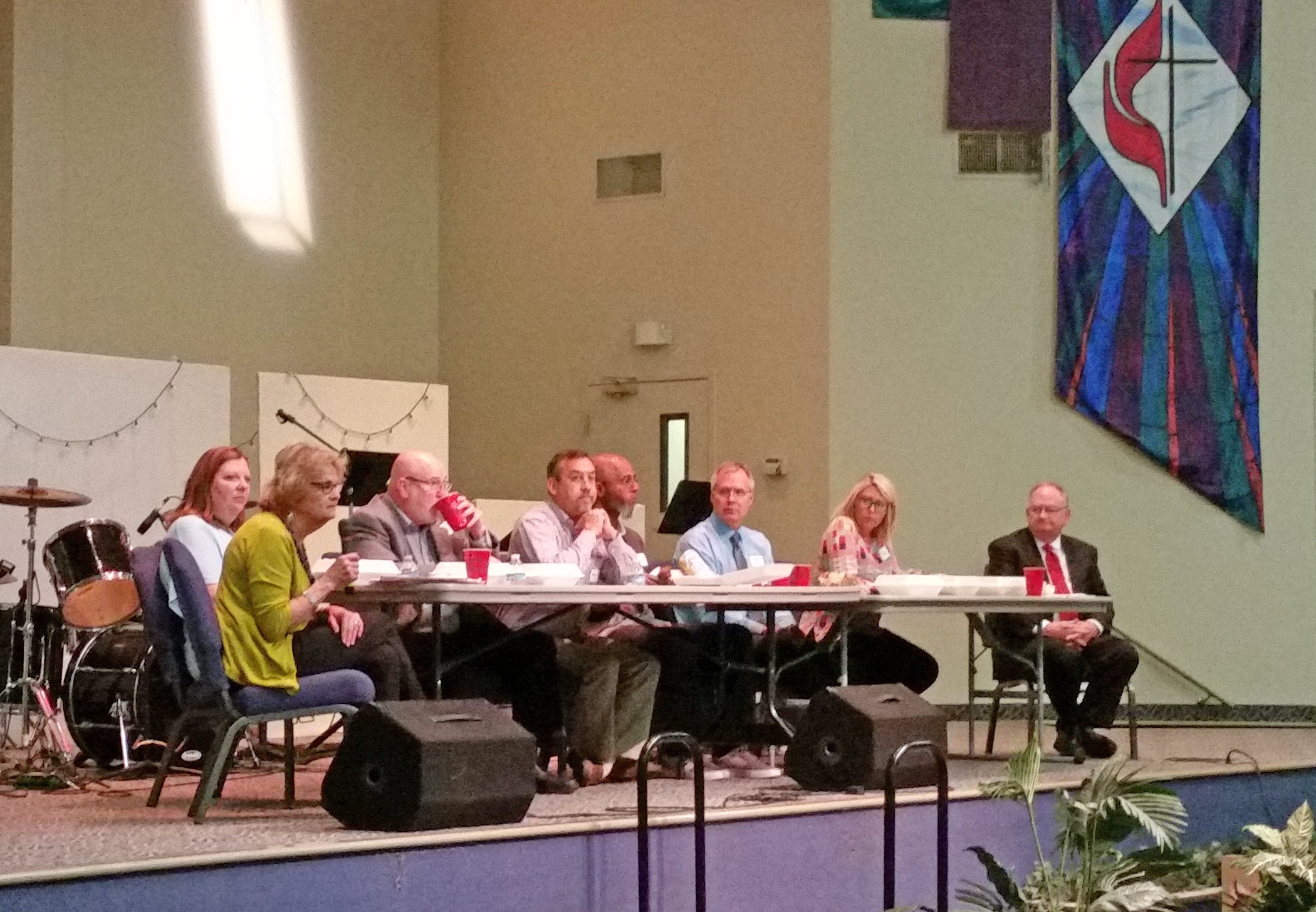Conference held for faith leaders to understand drug epidemic
Published 8:21 am Thursday, May 4, 2017

- Kendra Peek/kendra.peek@amnews.com The Panel of Hope at the Faith Leaders Conference, featuring, Kathy Miles, Anna Duncan, the Rev. Daryl Hodge, Mike Crowe, James Hunn, Mike Cox, Hilary Blevins and Jim Spurlin.
Getting resources to pastors and other church leaders was the focus of the one-day Faith Leaders Conference held at the Centenary United Methodist Church on Tuesday.
“When you have an addict or alcoholic who wants rehab … you have to act fast. You have a small window of time,” said Hilary Blevins of Mercer County, who sat on a panel with others in the community. Blevins is a recovering addict who, when she was ready to get clean, first went to her church for help. At the time, the church didn’t have the resources, or know where to send her for help, so she turned to family instead, who was able to do so. Blevins recently celebrated being five years clean.
“I was looking at my church and I felt my church let me down. It was not their fault,” she said. “Now I’m able to step up and be that person for others.”
Providing those resources, said Kathy Miles, coordinator of ASAP, is as big for families who need them as is being a resource.
“Knowing where resources are — that helps people,” she said, sitting on the panel.
Joining Miles, a retired clinical alcohol and drug counselor and married and family therapist, and Blevins on the “Panel of Hope” were:
• Jim Spurlin, director of Preston-Prewitt Spurlin Funeral Home;
• Mike Cox, the director of the Isaiah House, an addiction and recovery treatment center;
• James Hunn, director of the Circle of Hope, though the Hope Network and housed at Shepherds House IOP;
• Mike Crowe, executive minister at Indian Hills Christian Church, which hosts a long-standing Celebrate Recovery;
• Rev. Daryl Hodge, minister and Garrard County Coroner; and
• Anna Duncan, clinic manager of bluegrass.org in Boyle County.
Crowe talked about how families struggle with helping without aiding in the addiction cycle. The solution, panel members agreed, is to communicate, and to encourage those family members to ask for guidance from others.
It’s important to remember the addicts, but also their families and loved ones, especially after deaths, said the Rev. Daryl Hodge, coroner for Garrard County. The county has faced a slew of overdose deaths in the past several years — 20, Hodge said — but has also dealt with suicides connected to the drugs and alcohol.
He speaks to students each year in the schools, talking about how drug abuse most often results in death.
“If I can just impact one, I’ll take it. We have to start with one,” he said.
The event was sponsored by Boyle County Agency for Substance Abuse (ASAP), Hope Network, Bluegrass Prevention and Centenary United Methodist Church, held at the church.
“The turnout was good. It was not as — we always want it to be bigger,” said Kathy Miles, coordinator of ASAP. “There were a wide variety of people there, not just pastors and associate pastors, but other folks that have jobs at churches were there … It was a good opportunity to reach across denominational lines.”
The event featured breakfast and lunch, and was aimed at helping those in the faith-based community learn how to better respond to the drug-related issues facing their communities and Danville and Boyle County at large.
Pastor Ralph Smith, from St. James AME Church, was one of those who attended the event.
“I’m interested in what we can do about drugs,” Smith said.
Smith said people come to him, as their pastor, seeking help and seeking ways to help. Tuesday’s event was “much-needed,” because it gave him and other pastors guidance for their respective congregations.
It included speakers such as the Rev. Marcus Lynn, pastor of the First Christian Church of Versailles, who is the chair of the Woodford County Agency for Substance Abuse Policy. There was a workshop relating to the faith leaders with Cay Shawler, a certified psychologist, offering a brief overview of substance use disorders; and another featuring Anna Duncan, clinical manager of the Bluegrass.org Danville office which focused on helping active military, veterans, and their families. There was also an overdose response training and the distribution of naloxone; Miles said all of the kits they had were given out.
It has long been the plan of the Boyle County Agency for Substance Abuse Policy and the Hope Network to host an event like this, Miles said.
“It’s been a priority,” she said. “It’s really a priority for Hope Network — they’re the faith-based group and they want to get more (churches) involved … It’s hard to not get energized about what you can do about the problems after an event like this.”
The next conference from the Boyle County Agency for Substance Abuse Policy will be focusing on the data from high school students. It will be talking to parents and educators about what they can do to help those students, Miles said, and is being planned for the fall.
Another conference for faith leaders will be held, but there is not a plan in motion for that yet.






